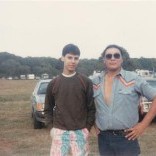Flags
Remy Reed Pincumbe
There’s a house on my street with a very tall flagpole, and flying from that flagpole is a very large flag.
I walk past it every day on the way to the bus stop, unless it’s raining, and then my mom drives me past it on the way to the bus stop. For a long time I didn’t notice it, because I don’t like to look at that house, because the people that live there look like the Berenstain Bears and will yell out a window if your dog even thinks about taking a dump in their yard, even if you’re standing there slouched and cringing with a bag at the ready.
But there are some things that catch the eye and stick, images like a bad song in your head. The flagpole is getting taller, the flag getting larger, and it no longer matters where I am in this stupid little town—everywhere I go, it sees me. There are eyes on it, a lot of them. They watch me in the passenger seat of my mom’s car, watch me daze my way through school, watch me walk down the street with my walk that’s all wrong.
The Berenstain family doesn’t celebrate Halloween, but they celebrate extra hard at Christmas. They put out yard signs with words like Patriot and Pride and Pursuit of Happiness, but they call the cops if you set off firecrackers any time but the 4th of July.
Other people in town have flags—of eyes, of stars and stripes, of crosses and snakes—but this is the only one that grows an inch or more every day, the fabric lengthening, the stitches spreading. This is the only one that breathes, taking huge gulps of wind and expelling something that feels sour, stale as I walk past. This is the only one that will crush me if and when it falls.
All day at school I fantasize about scaling the Berenstain’s flagpole and lighting the flag on fire. The eyes burn out first, then the rest, until the charred remains float around town like snowflakes, and the flagpole unravels like a paper straw. It’s only in fantasies that my body ever does what I want it to do. I can’t land a tennis ball inside the lines. I can’t climb the gym rope more than one foot and seven inches. Even in my dreams my muscles are stringy and useless, my legs drag through sand, and the things that chase me always catch up.
I wander the neighborhood with Spotify and tense shoulders and not enough sunscreen, and when I pass the house with the flagpole the Berenstain dad emerges from a hedge and calls my name. When I shuffle up to him, he looks me over and offers advice on weightlifting and having a healthy relationship with The Lord. The son walks over and rolls his eyes, sighing while his dad speaks, and I can’t look at him. Fever pulses in my face. My smile is cracked glass.
I go to the Family Fare and see the Berenstain mom in the frozen food aisle. I shiver while she tells me—hand on my goose-bumped arm and oh, honey smile on her face—that I should cut my hair, and that I shouldn’t walk like that, and that she knows it must be so hard without my dad around. The daughter is with her, and she stares at the scuffed gray floor, arms wrapped around herself same as they always are at school, where she speaks to no one and wears a look on her face like she’s passing through a long, dark tunnel. It’s a look I often catch in my own reflection, a look that says just survive.
Sometimes the daughter is on their porch when I pass by on my way to the bus stop, because she has a car and does not need to leave early to take the bus. She is always reading, and she never says hello.
School is hot and impossible. I hit tennis balls over the fence and fail algebra. I hide in the I.T. room at lunch and spend Biology not looking at the Berenstain son that my mom tells me I need to be friends with because we’re the same age, and we’re neighbors, and we’re both in Youth Group at the Second First United Baptist Church, and who I can’t be friends with because he can’t speak to me without descending a rung on the social ladder, and I can’t speak to him without stuttering.
How was school, my mom says, and I say, I think the neighbors’ flag is getting bigger.
My mom sighs, and tells me it’s not getting bigger, it’s not looking at me, it doesn’t mean what I think it means—it means something historical, something harmless, something celebrating Southern culture, even though the Berenstains have been Michiganders even longer than my family has. It means so many things it might as well not mean anything at all and I shouldn’t believe the articles I found.
But in Biology the Berenstain son sits behind me and wears a t-shirt that includes the words God and Guns, and I think I probably should believe the articles I found. And my mom is wrong—the flag is getting bigger. When it’s not windy out it drapes over their roof, and when it is windy out its edges get snagged on the pines. The flag gets bigger and the eyes get bigger, multiply, follow me even when I can’t see them. I wonder what they’re feeding it.
It’s so big it’s starting to block the house next door, starting to cover the porch and the daughter’s eyes while she reads, so large my mom’s car catches a corner and leaves a tire print that is washed away by nightfall. It’s spawning copies—little flags planted in gardens, stuck to car windows, washing up in gutters. The Berenstain son smacks my Biology folder out of my hands, and when I pick it up there’s a tiny imprint of the flag in the yellow corner.
The flag is on TV while we eat dinner. The flag is in our garage, on our car, on our walls, on my plate, wrapped around my throat.
I’ve spent sixteen years attempting every hobby in My Book of Hobbies and God’s Book The Bible, and though none of them stuck, my mom kept all the evidence in the basement. It’s a Michigan basement, low and often flooded, full of boxes of stained-glass window paint, piles of WWJD bracelets, stacks of coloring book Bible illustrations that my mom keeps around like she might be asked to prove something unprovable.
Flag making is not in My Book of Hobbies and God’s Book The Bible, but I give it a shot anyway, drag all the boxes into the living room and cut up the abandoned hobbies into piles of beads and fabric and paper. I make flags with whales and cakes and rainbows and astronauts, flags with beads and streamers, with cut-out Bible characters, with cat pictures paired with inspirational phrases. I make maritime flags that spell out lines from my favorite songs and all my secrets.
I take a walk at night with silence and tense shoulders and a wagon full of flags, and when I reach the house with the flagpole, I realize everyone is asleep but the flag. Its eyes peer down at me, looking and wondering and knowing. I pull it down and fold it up and leave it on the porch for the Berenstain daughter to find in the morning when she lets the dog out and sits on the porch with her book. I fantasize about her grabbing a kitchen knife and slicing the thing into a thousand flimsy bookmarks, squashing the many eyes between her pages.
I unwrap all the flags in my wagon and string them up, one by one, and when the flagpole is full, I hang them over windows, drape them over cars, string them between pines, and everything rustles in the wind like a sad hopeful night song.
I stand in the street and watch them sway.





